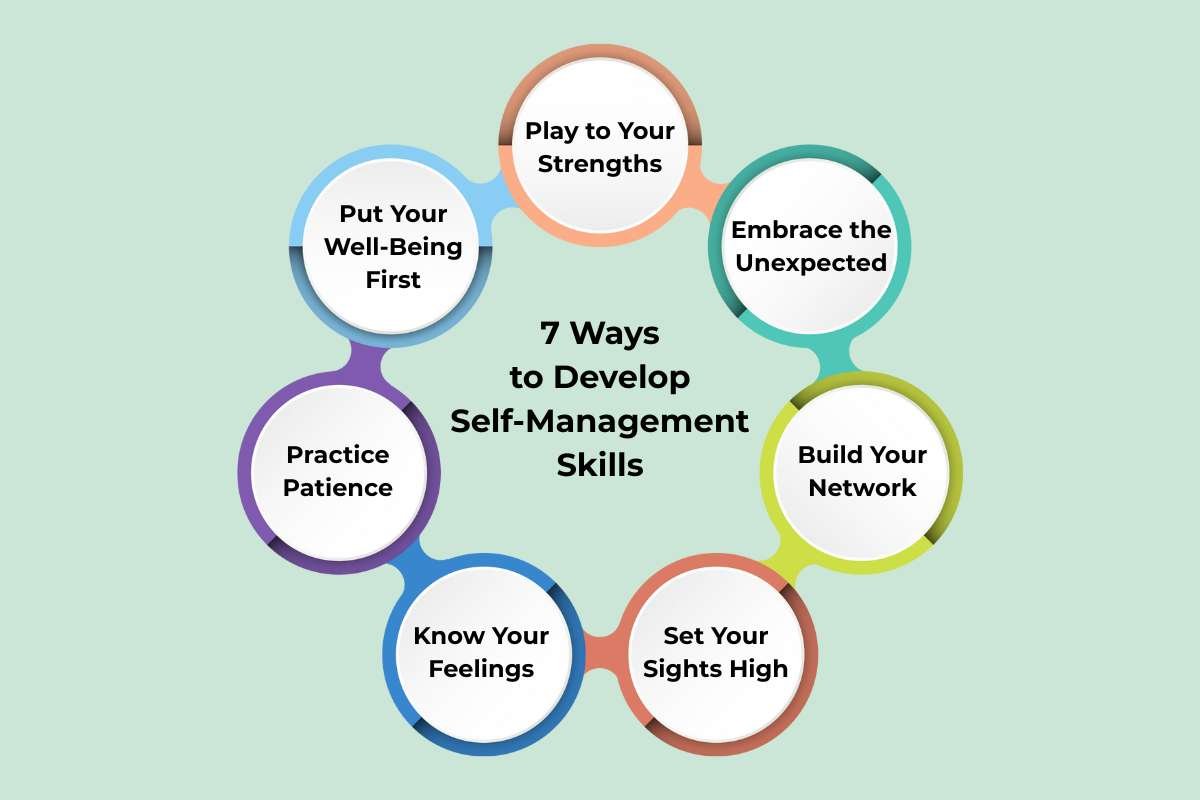Just as you would upgrade your phone’s operating system to gain optimal performance, the highest-level professional development is always to improve your self-management skills. These are not hype words. They are the tools you require to effectively live well in a fast-moving, competitive world. With these skills in your library of abilities at your disposal, you can effectively improve the art of managing yourself. That skill can open the door to the excellence and possibilities available to you.
Think of it as the hidden software under the hood of successful professionals. Importing these skills into your skillset is the best investment in yourself. This helps you to gracefully manage difficulties and believe when appealing opportunities. Are you ready to figure out what your potential truly is?
What are Self-Management Skills?
According to the University of Cambridge, “Self-management skills focus on how you understand and regulate your emotions, behaviours, and thoughts to achieve your goals and navigate challenges effectively. They involve taking ownership of your actions, managing your time and priorities, and maintaining focus on your objectives.”
Here are some Key components to consider:
- Self-awareness: Understanding personal strengths, weaknesses, triggers, and emotional responses through reflection and feedback. This helps you recognize how your actions impact others and your performance.
- Goal setting: Creating clear, measurable objectives, often using the SMART framework to boost focus and motivation. It provides a roadmap for your career and personal life, turning aspirations into concrete actions.
- Time management: Prioritizing tasks, managing daily schedules, and avoiding procrastination for effective productivity. This ensures you make the most of your time, dedicating it to high-impact activities.
- Adaptability: Adjusting to new conditions, handling changes smoothly, and learning new skills as priorities shift. This resilience allows you to thrive even in unpredictable environments.
- Accountability: Taking responsibility for actions, following through on commitments, and learning from results. This builds trust with colleagues and managers, positioning you as a reliable professional.
- Stress management: Identifying and coping with stressors through physical activity, mindfulness, or positive thinking. This helps you maintain a healthy mindset and high performance under pressure.
- Emotional regulation: Practicing mindfulness and responding calmly to triggers rather than reacting impulsively. This enables you to navigate conflicts and difficult situations with poise.
- Self-motivation: Finding the internal drive to take initiative and maintain sustained effort without external push. This is the fuel that powers your ambition and keeps you focused on your long-term vision.
- Decision-making: Evaluating options and making choices that align with goals and circumstances. Strong decision-making skills allow you to act decisively and confidently, leading to better outcomes.
- Problem-solving: Analyzing issues, considering solutions, and implementing effective actions. This skill demonstrates your ability to think critically and find creative ways to overcome obstacles.
| Component | Description |
| Self-awareness | Recognizing strengths, weaknesses, and triggers |
| Goal setting | Defining and pursuing clear objectives |
| Time management | Organizing and prioritizing tasks |
| Adaptability | Adjusting to new situations |
| Accountability | Owning actions and outcomes |
| Stress management | Coping and reducing stress |
| Emotional regulation | Managing feelings and reactions |
| Self-motivation | Driving oneself to act |
| Decision-making | Choosing the best course of action |
| Problem-solving | Addressing and resolving issues |
7 Ways to Develop Self-Management Skills
“There is no such thing as time management; there is only self-management.” – Rory Vaden.
This list provides seven actionable strategies to improve your self-management skills. This will help you take control of your career and personal growth:

1. Play to Your Strengths
Don’t just work hard; work smart. Pinpoint what you’re naturally good at, whether it’s keeping a team focused or solving complex problems. By leaning into your talents, you can apply them strategically to your personal and professional goals, making every effort count.
2. Embrace the Unexpected
Challenges are inevitable, but your response is a choice. Instead of fearing what might go wrong, develop a proactive plan to tackle potential problems. This adaptive mindset allows you to face obstacles head-on and adjust your approach with confidence.
3. Build Your Network:
Your relationships are a core part of who you are. Invest time and energy in nurturing connections with friends, family, and colleagues. Actively engaging with others shows you hold yourself accountable and strengthens the support system that shapes your daily life.
4. Set Your Sights High
The most effective leaders are always evolving. Define your long-term goals and make a conscious effort to work toward them every day. Prioritize these personal aspirations just as you would any critical project. It is how you consistently build a better version of yourself.
5. Know Your Feelings
Emotional intelligence is a cornerstone of self-management. Learn to recognize and understand your emotions, especially during conflict. This awareness gives you the power to regulate your reactions and interact with others in a healthy, productive way.
6. Practice Patience
Success doesn’t happen overnight. Be patient with your progress and with the people around you. Developing this skill works hand-in-hand with emotional regulation, helping you approach your goals with a calm and collected attitude, no matter how long it takes.
7. Put Your Well-Being First
You can’t pour from an empty cup. Schedule time for self-care, whether it’s a quick break or a full day to recharge. Prioritizing your mental and physical health prevents burnout and ensures you have the energy and clarity to manage everything else in your life effectively.
Also Read:
- What are some Time Management Strategies you can Use? 8 Tips from Enterprise Wired
- Employee Self-Evaluations: A Comprehensive Guide
How Self-Management Skills Boost Career Growth?

These skills are a major driver of career growth because they boost productivity, build reliability, and prepare professionals for advancement and leadership roles.
- Productivity and Results: Employees with strong self-management skills set clear goals, prioritize tasks, and efficiently manage time. This results in consistently high-quality work output.
- Independence and Leadership Potential: Being able to work autonomously shows readiness for leadership roles and reduces the need for constant supervision. This makes self-managing professionals ideal candidates for promotions.
- Accountability and Trust: When professionals take responsibility for their actions, employers and team members develop trust. This could lead to greater responsibility and opportunities for career advancement.
- Resilience and Adaptability: Self-management skills help individuals handle stress, adapt to changing work conditions, and remain focused on goals even in challenging environments, all traits highly valued for career progression.
- Better Work Relationships and Collaboration: Self-managed individuals communicate effectively and contribute positively to teams, improving collaboration and increasing positive recognition from managers and colleagues.
- Continuous Learning and Development: These skills foster a proactive attitude towards personal growth, encouraging professionals to seek training, develop new competencies, and align work goals with long-term career objectives.
Best Tools and Resources to Build Self-Management Skills:
A wide range of tools and resources is available to help develop and strengthen your management skills.

1. Digital Tools and Apps:
Using technology can really improve your ability to self-manage. Project management tools such as Asana and Trello can help speed up your processes in organizing tasks and staying accountable for completing your work. And goal-tracking apps like Habitica can help you gamify your road to progress. To help you with your emotional regulation or focus, look to mindfulness and mental health apps, such as Calm or Smiling Mind, which offer meditations and techniques for optimal stress management.
2. Skill Development Resources
Level up your self-management skills with a variety of resources. You can enroll in online courses and workshops from platforms like Cambridge Careers Service to build essential skills like time management and digital productivity. For more personalized growth, consider seeking support from mentors, advisors, or even therapy apps like Talkspace to help you set realistic goals and stay accountable.
3. Key Practices and Techniques
Cultivating self-management skills starts with small, daily habits. By setting and tracking achievable goals, you can build momentum while improving discipline. Practice mindfulness and use simple techniques like “pause and breathe” to better understand your emotions, which will help you adapt to challenges with grace. Lastly, stay organized with tools, and remember to schedule regular breaks to maintain your well-being.
Common Challenges and Ways to Overcome Them:
1. Poor Time Management
Solution: Set clear, specific goals using frameworks like SMART, prioritize tasks, and use tools or schedules to stay organized and meet deadlines consistently.
2. Managing Stress and Emotions

Solution: Practice stress reduction techniques such as mindfulness, exercise, and emotional regulation strategies to maintain focus and composure under pressure.
3. Maintaining Accountability and Motivation
Solution: Take ownership of work outcomes, communicate progress regularly, seek feedback, and cultivate self-motivation to build trust and drive continuous improvement.
Also Read:
- 18 Leadership Qualities and Strategies on How to Develop Them?
- Best Personal Development Podcasts for Levelling Up Your Life
- 15 Must-Read Management Books for Your Professional Growth
Conclusion
In the rapidly evolving world we live in, self-management skills are no longer a luxury. They are actually the essential operating system for professional success. These skills give you the autonomy to be your own leader. Along with that autonomy comes the power to manage your time, feelings, and goals proactively. When you hone these skills, you become not only someone who can manage life’s challenges in a calm & self-assured manner, but you start an ongoing growth journey that makes you essential in any career.
FAQ:
1. What are the key examples of strong self-management skills in daily life?
Examples include time management, goal setting, stress control, self-discipline, adaptability, and accountability. These skills help individuals stay organized and make better decisions every day.
2. Do self-management abilities differ between personal and professional life?
The core skills remain the same, but their application differs. In personal life, they help maintain balance and self-discipline, while in professional life, they ensure productivity, teamwork, and career growth.
3. Are self-management abilities more important than technical skills for success?
Both are important, but self-management often determines how effectively technical skills are applied. Without discipline, time management, and focus, even strong technical expertise may not translate into success.
References:










